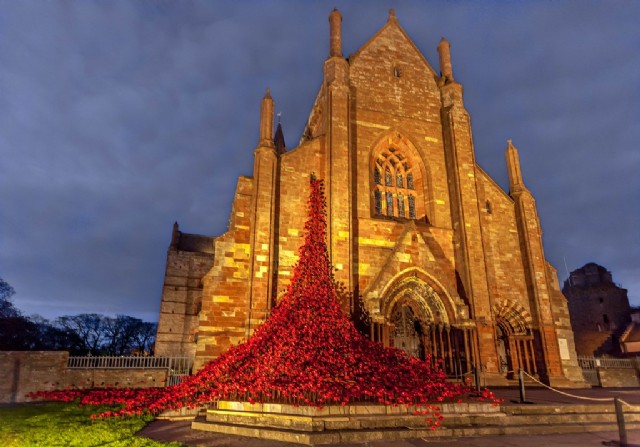A Sweetness Absent From The Ocean Air Poem by John Beaton
A Sweetness Absent From The Ocean Air
The Weeping Window bleeds ceramic poppies
that blush St. Magnus's cathedral wall
and each seems miniscule among them all—
the throng comprises nigh a million copies:
one bloom per British serviceman who died
in World War One, a massive flower bed
entitled "Blood Swept Lands and Seas of Red"
displayed in London where it dignified
that War's centenary. Now part has traveled
to Orkney, here to mark one century
since dreadnought fleets waged battle on the sea
near Jutland. Lifelines tangled and unravelled—
in two short days eight thousand men and more
succumbed as riven battleships went down.
With Princess Anne, the envoy of the Crown,
their relatives are welcomed at the door
of this, the Viking edifice erected
in memory of Magnus, who eschewed
bad blood in favor of the holy rood,
a man of peace, nine hundred years respected.
Some families take pause and stare, as if
they hope the flower avatar of their
lost sailor lad will wave. As they repair
into the church, the poppies stand up, stiff
like soldiers at attention on parade;
their stems are wire, their heads are crimson clay
and, grouped, they seem ethereal, a fey
honor guard shipshapedly displayed.
The British and the German brass bands march
along the harbor front then through the streets;
this day there are no triumphs or defeats—
they gain the church grounds through a common arch—
and then the pipe band, clad in kilts, assemble.
No instrument of war can so foment
bravado then bestow such dark lament:
Great Highland Bagpipes set the air atremble,
the Weeping Window work of art revives,
more vehemently, the ones who drowned and bled,
and now we see, in child-tall blooms of red,
a sad cascade of young, foreshortened lives.

The poem is written in two 20-line stanzas, the first setting the scene and the second dealing with its emotional impact on the participants and observers. Each stanza has five groups of four lines, each rhymed abba. The lines are in iambic pentameter (five da-DA's) with minor variations, e.g.
the WEEping WINdow BLEEDS ceRAmic POPpies
The title echoes the lines "Full many a flower is born to blush unseen, And waste its sweetness on the desert air." from Thomas Gray's "An Elegy Written in a Country Churchyard."
This poem won the Goodreads "poem of the month" competition for December 2017 and is posted on their blog (December 2,2017) . It was subsequently published in "Eyes on BC" magazine and "Better than Starbucks" poetry magazine.
Nicely done Sir, and well worthy of the laurels. Many things pass too often unremembered, or worse still, ill-remembered. A tip of the hat for calling out Gray and accurately capturing the sacred mystique of the Pipes...
Thanks, Gordon. This was a centenary, a commemoration of an event before my time, but it was well-remembered.
This poem has not been translated into any other language yet.
I would like to translate this poem
Many thanks to you for this great poem.
Thanks, Jackie. As an acclaimed WW1 author, your feedback is much appreciated.